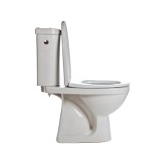Should I be worried if it hurts when I am passing stools?

babyadmin |
Piles or haemorrhoids can occur in about half of all pregnancies. They are very uncomfortable but usually pose no danger to mother or baby.
Signs of piles or haemorrhoids
If it hurts when you are passing stools or right after, you have haemorrhoids. You could also see fresh blood or mucus discharge on your stools or on the toilet paper after your bowel movement.
If you have sat in a particular position for too long, you could also feel sharp pain in the anal region. There may also be a persistent ache, itch or even a burning sensation around the anus.
Causes of piles or haemorrhoids
There are several causes of piles or haemorrhoids.
One major cause is that during your pregnancy, there is a steady increase in your blood volume circulation as you are nourishing both yourself and your baby. The high levels of preogesterone also make your veins more dilated. As your uterus enlarges, coupled with the increased blood flow to your pelvic area, the veins in your rectal wall may swell, thus causing bulging and itching or even pain.
You may also be suffering from constipation as a result of your pregnancy. As you try to pass stools, you will put extra pressure on the rectal walls and anus, which will aggravate the swelling and thus the itching or pain.
Risks of piles or haemorrhoids
While haemorrhoids are quite common during pregnancy, especially in the third trimester, any rectal bleeding should certainly be checked out by your doctor to make sure that it is nothing serious. The same applies if you are suffering from severe discomfort even after you've taken steps to minimize the symptoms.
Steps to minimize piles or haemorrhoids
At night, sleeping on your side and not your back will help to minimize pressure on the rectal veins. In the day, try not to sit or stand for long stretches of time. A seat ring, which is a doughnut-shaped pillow, may help to further alleviate pressure from the area when you are sitting down.
In the loo, if you can't pass stools, do not overstrain yourself trying. If you do manage, clean the area the best you can. Warm water is best, but if you need to use paper, do not wipe too hard or you will further irritate the anus. Gentle baby wipes may be helpful here.
To prevent constipation, try to eat plenty of fibre and drink lots of liquid. This will help to give you smoother bowel movements, which will prevent your haemorrhoids from getting worse.
Doing pelvic floor exercises may also help to prevent haemorrhoids. With these exercises, there will be better blood circulation in your bottom, and at the same time, the muscles there become stronger, and hold up your extra belly weight better.
